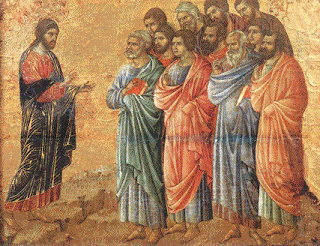Mt. 15: 1-2, 10-14
Some Pharisees and scribes came to Jesus from Jerusalem and said,
"Why do your disciples break the tradition of the elders?
They do not wash their hands when they eat a meal."He summoned the crowd and said to them, "Hear and understand.
It is not what enters one's mouth that defiles the man;
but what comes out of the mouth is what defiles one."
Then his disciples approached and said to him,
"Do you know that the Pharisees took offense
when they heard what you said?"
He said in reply, "Every plant that my heavenly Father has not planted
will be uprooted.
Let them alone; they are blind guides of the blind.
If a blind man leads a blind man,both will fall into a pit."
In occasional discussions of the Mass with children or adults, I’ve been asked the question about the meaning of the often simple actions of the priest. For example why does the priest put a small drop of water into each chalice of wine? Why does the priest wash his hands after offering the gifts of bread and wine on the altar? As each of these is carried out, as all things in the Mass are connected, they have symbolic meaning as the priest prays quietly during those actions.
The first, water with wine, is symbolic of the two natures of Christ: divine and human. As the priest drops a small amount of water into the wine he prays: “By the mingling of this water and wine may we come to share in the divinity of Christ who humbled himself to share in our humanity.” It’s a simple but meaningful action which is symbolic of divinity and humanity joined in Christ Jesus.
The second may draw some light on the Gospel passage above read at Mass this Tuesday. As the priest walks over to the servers who hold the water and bowl with towel, he “washes” his hands and prays: “Lord, wash away my iniquity and cleanse me of my sin.” It is a cleansing ritual which reminds the priest of his unworthiness to offer the gifts of bread and wine to become the Body and Blood of Christ.
I’ve been asked more than once if it recalls the washing of hands by Pilate before the condemnation of Jesus. I thought, “Does that make me Pilate? Yikes!” No, it has nothing to do with Pilate’s action.
The Gospel passage above speaks of criticism by the Pharisees that Jesus’ disciples are not washing their hands before eating a meal. It was all part of Jewish ritual and symbolic of purification. At the same time, it was good advice frankly. Since most meals were eaten with your hands, no knives or forks, why would you not want clean hands? Are the Apostles just sloppy and really don’t care much about their overall hygiene? Jesus’ response has nothing to do with hand washing because he knew the Pharisees' real intent to criticize.
Jesus takes the occasion to disparage the Pharisees’ obsession about following the law and placing such man-made ritual on the same level as divine law. While there is nothing wrong with washing your hands, this is more about not seeing the forest for the trees. In fact, he refers to the blindness of the Pharisees. They don’t get it but think they do and they’re intent on being sure that everyone else sees things their way.
In other words, the outside of a person became far more important than internal conversion of heart. It was assumed that if you appeared to be following law, ritual, and dress then you were an acceptable Jew. That these rituals were the focus of Jewish life and that what counted was your obedience to the law. Jesus’ response, “It is not what enters one's mouth that defiles the man; but what comes out of the mouth is what defiles one."
God calls all of us to conversion of heart and life – to interior change. To know and obey God’s law is the right thing, obviously. But no matter how beautiful or handsome a person may be; no matter how much money someone may spend on clothing, hairdressers, cosmetics, lipo-suction, tummy-tucks, etc if there is no change of heart and mind as a Christian, then we are like the Pharisees.
We all should be clean and acceptable in appearance. No one would deny that. But if that is the focus of my life as a Christian then I may need a bit of re-thinking. The Gospel invites us to follow the way that Jesus shows us.
Our Catholic Church provides many rituals. We can do holy things without ever becoming holy if there is no openness to change where change may be needed. We can just mouth the words and go through the motions if we like and no one would ever know that we just don’t get it. But our values, our actions, and our words would reveal much more.
These words of the Gospel are good food for thought as we live in a society that is saturated with the importance of youth, beauty, success, and who and what is acceptable. It can be a delicate balance and we may be tempted to judge people based only on their appearance. But, Jesus calls us to recognize where both sin and virtue lie – that is within us.
It may beg the question, where does true beauty lie? What part of me is insincere? Am I more concerned with what people think than with how I can be Christ to others?

No comments:
Post a Comment